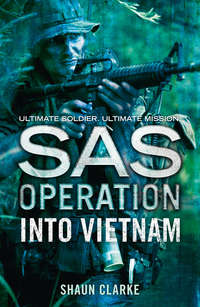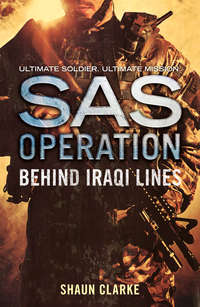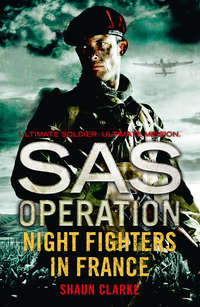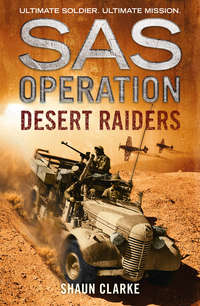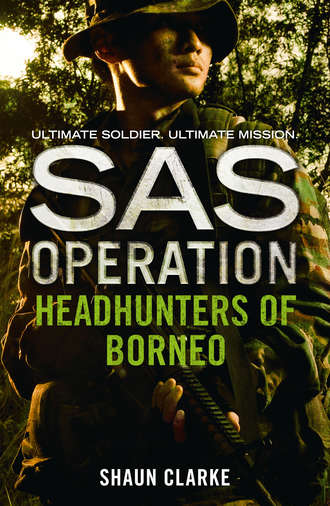
Полная версия
Headhunters of Borneo
‘Hi, boss,’ Sanderson said, shaking the sergeant’s hand. ‘Boy, have you lost a lot of weight already!’
The sergeant grinned and shrugged. ‘Three stone fell off me just living here for two weeks. You’ll all look the same soon enough.’ He indicated the clearing with a wave of his right hand and all of them, glancing around at the oblique beams of sunlight streaking the gloom, realized just how hot and humid it was. ‘Ditch your gear and fix up your bashas. This is home for the next week or so. I’m sure you’ll enjoy it. When you’re ready, gather around my lean-to and I’ll tell you what’s happening.’
When the helicopter had taken off again and its slipstream had died down, the men followed Hunt’s example by constructing triangular shelters with their waterproof ponchos, first hammering two Y-shaped sticks into the ground about six feet apart, running a length of rope between them and tying the rope tight, then draping the poncho over the rope and pegging the ends down to form a triangular tent. A groundsheet was rolled out inside the tent and covered with dry grass to make a mattress. A sleeping bag was then rolled out on the grass to make a soft bed. All of the lean-tos were well hidden by clumps of bamboo and screened from above by the soaring trees.
When their kit had been placed carefully around the inner edges of the tent, the men lit their hexamine stoves outside and brewed up. They drank their tea gathered around Hunt, hearing what he had been up to since arriving there a fortnight earlier.
‘As most of you know,’ he began, ‘when waging our hearts-and-minds campaign in Malaya, we transplanted the aboriginals from their original kampongs into new, fortified villages, well out of reach of the CTs. Given the nature of the locals, as well as the terrain, there’s no possibility of doing that here. In any case, most of the tribesmen are well disposed towards the British and we have to capitalize on that by relying on non-violent persuasion and using them where they live, rather than attempting to move them on. To this end I’ve already made contact with the elders of the nearby kampong, which is about five minutes from here.’
He pointed at the dense jungle to his left.
‘My first step towards penetration was to build this hide within walking distance of the kampong. From here, I kept the village under observation long enough to ensure that neither guerrillas nor Indonesian regulars were already established there. Once I was sure that they weren’t, I walked in, all smiles, and made contact through a combination of basic Malay and sign language. Gradually, they came to accept me and I started helping them with modest medical aid and by bartering some of my possessions for some of theirs. Now that I’ve been accepted, I can introduce you as friends and hopefully you’ll win their trust the same way, gradually becoming part of the village and sharing their lifestyle. Once that’s been accomplished, we’ll persuade them that our other friends should be invited in, too. If they agree, we can then call in the regular Army and Gurkhas – all one big happy family. We then use the village as a Forward Operating Base, moving out on regular patrols into the ulu, hopefully with the help of the villagers.’
‘What are they like as people?’ Dead-eye asked.
‘Physically small, generally cheerful, and lazy.’
‘Sounds just like me!’ Pete quipped.
‘They don’t cut their hair,’ Hunt continued, ignoring the quip. ‘Nor do they dress above the waist – neither the men nor the women – so you’ll have to learn not to let the females distract you too much.’
‘I’m willing to die for my country,’ Alf said, ‘but what you’re asking is too much.’
‘I’m very serious about this,’ Hunt said sharply. ‘Certain proprieties have to be maintained here, no matter how you might feel to the contrary. For instance, the village elders have a tendency to offer their daughters as a gesture of goodwill. You won’t get into trouble if you politely refuse. However, you may get into trouble if you accept.’
‘My heart’s breaking already,’ Pete said. ‘I know just what’s coming.’
‘Although, as I’ve said, the natives are generally cheerful, the young men suffer jealousy like the rest of us mere mortals and could take offence if you take their girls. In short, if you receive such an offer, make sure you refuse.’
‘What kind of gifts should we give them?’ Terry asked, as solemn as ever.
‘You don’t. Generally speaking, the Malay system of giving gifts doesn’t work here, though bartering of a minor nature is enjoyed. Instead, what you do is be mindful of their pride, showing tact, courtesy, understanding and, most of all, patience regarding all aspects of their lifestyle. Also, it’s vitally important that you show respect for the headman, whose dignity and prestige have to be upheld at all times. Obey those few simple rules and you should have no problems.’
‘So when do we start?’ Dead-eye asked.
‘Today,’ Hunt replied. ‘At least one man has to stay here to guard the camp at all times – this will be a rotating duty – while the others go into the kampong. As Corporal Sanderson is already familiar with the Indians, he’ll stay here today and the rest of you can come in with me. Leave your weapons here in Sanderson’s care, then let’s get up and go.’
‘We’re going straight away?’ Terry asked, looking uneasy.
‘That’s right, Trooper. What’s your problem?’
‘He’s embarrassed at the thought of seeing all those bare boobs,’ Pete said, making Terry blush a deep crimson.
‘Cherry-boy, is he?’ Hunt asked crisply.
‘No!’ Terry replied too quickly. ‘I’m not. I just…’
‘Think you’ll get a hard-on as soon as you see those bare tits,’ Pete interjected, giving form to Terry’s thoughts. ‘Well, no harm in that, son!’
‘Just keep your thoughts above the waist – yours, that is,’ the sergeant said, ‘and you should be all right. OK, men, let’s go.’
As Sanderson stretched out on the grassy ground beside his basha and lit up a cigarette, the others extinguished the flames from the burning hexamine blocks in their portable cookers, then followed Hunt into the dense undergrowth. Surprisingly, they found themselves walking along a narrow, twisting path, barely distinguishable in the gloom beneath the overhanging foliage.
Terry, the least experienced in the group, immediately felt oppressed and disorientated by the ulu. He had stepped into a vast silence that made his own breathing – even his heartbeat – seem unnaturally loud. Instead of the riot of birds, wildlife, flowers and natural colours he had expected, he found only a sunless gloom deepened by the dark green and brown of vine stems, tree-ferns, snake-like coils of rattan, an abundance of large and small palms, long, narrow, dangerously spiked leaves, gnarled, knotted branches – and everywhere brown mud. Glancing up from the featureless jungle, he was oppressed even more by the sheer size of the trees which soared above the dense foliage to dizzying heights, forming vertical tunnels of green and brown, the great trunks entangled in yet more liana and vine, disappearing into the darkness of their own canopy, blotting out the sunlight.
Looking up, Terry felt even more dizzy and disorientated. In that great silent and featureless gloom, he felt divorced from his own flesh and blood. His racing heart shocked him.
Though the hike took only five minutes, it seemed much longer than that, and Terry sighed with relief when the group emerged into the relative brightness of an unreal grey light that fell down through a window in the canopy of the trees on the thatched longhouses of the kampong spread out around the muddy banks of the river. The dwellings were raised on stilts, piled up one behind the other, each slightly above the other, on the wooded slopes climbing up from the river. Some, Terry noticed with a tremor, had shrunken human heads strung above their doors. The spaces below and between the houses, where the ground had been cleared for cultivation, were filled with the Iban villagers – also known as Sea Dyaks because they had once been pirates – who, stripped to the waist, male and female, young and old, were engaged in a variety of tasks, such as cooking, fishing, laundering, picking jungle fruit – figs, durians, bananas and mangos – or working in a small, dry padi, where their basic food, rice and tapioca, was grown. This they did with no great expenditure of energy, except when playing odd games and giggling. Their longboats were tied up to a long, rickety jetty, bobbing and creaking noisily in the water. Buffalo and pigs also congregated there, drinking the water or eating the tall grass as chickens squawked noisily about them.
‘They fish in that river,’ Hunt explained. ‘They also hunt wild pig, deer, birds, monkeys and other animals, using traps and the odd shotgun, but mostly blowpipes that fire poisoned arrows. Annoy them and they’ll fire them at you – so don’t steal their women!’
Terry was blushing deeply, Pete and Alf were gawping, and Dead-eye was staring impassively as a group of bare-breasted women, giggling and nudging each other, approached behind a very old, wizened man who was naked except for a loincloth and, incongruously, a pair of British army jungle boots. Obviously the headman, he raised a withered arm, spread the fingers of his hand, and croaked the one word of English he had learned from Sergeant Hunt: ‘Welcome!’
Two weeks later, Terry had stopped blushing at the sight of the bare-breasted women, but felt even more disorientated and removed from himself. This had begun with his first short trek through the awesome silence and gloom of the ulu, but was deepened by his daily visits to the kampong and his increasingly intimate interaction with the Ibans. They were so gentle and good-natured that he could not imagine them as pirates, let alone as the headhunters they obviously were, judging by the shrunken heads on prominent display. Certainly, however, they lived a primitive life of fishing in the rivers, hunting animals with blowpipes, tilling the kampong’s one rice-and-tapioca padi, and constantly maintaining their longhouses with raw materials from the jungle. They also engaged in amiable barter, trading jungle products such as timber, rattan, rice, tapioca, fruit, fish, even the swiftlet’s nests used for Chinese soup, in return for clothes, boots, rifles, tins of baked beans, chewing gum and cigarettes. Bartering, from the point of view of the SAS troopers, was the easiest way to the affections of the villagers, leading to much giggling and backslapping.
Once this had become commonplace, however, the men started winning the hearts and minds of the Ibans in other ways: Pete showed them how to use explosives for various small tasks, such as blowing fish out of the water; Alf ran a daily open-air clinic to deal with their real and imagined illnesses; Terry entertained them by tuning his shortwave radio into various stations, which invariably reduced them to excited giggles; Dead-eye trained some of them in the selective use of weapons; and Hunt and Sanderson took turns with Dead-eye to teach English to the more important men of the kampong.
The SAS men spent most of their waking hours with the Ibans, which made for a long and exhausting day. Invariably, this began at first light when, just after breakfast, they would make the short hike through the ulu from their hidden camp to the kampong. After an average of twelve hours in the kampong, eating their lunch with the Ibans, they would make their way back to the camp, invariably at last light and concealing their tracks as they went, to have a brew-up and feed gratefully off compo rations.
The Ibans were very sociable, and often, in the interests of good manners and improved relations, the troopers would be obliged to stay in one of the longhouses to partake of native hospitality. For all of them, this was pure torture, particularly since the villagers’ favourite meal was a stinking mess called jarit, which they made by splitting a length of thick bamboo, filling it with raw pork, salt and rice, and burying it for a month until it had putrefied. Indeed, while Dead-eye and Hunt were able to digest this stinking mess without bother, the others could only do so without throwing up by washing it down with mouthfuls of tapai, a fierce rice wine which looked like unfermented cider, scalded the throat and led to monumental hangovers. Nevertheless, when drunk through straws from large Chinese jars, it was potent enough to drown the stench and foul taste of the jarit.
The eating and drinking, combined with the accompanying entertainments, in which the SAS men were obliged to dance for the villagers, was made no easier by the fact that many families shared a single longhouse and the air was fetid not only from their sweat and the heat. Also, because they used the floor as a communal toilet, urinating and defecating through the slatted floor onto the ground below, the pungent air was thick at all times with swarms of flies and mosquitoes.
Luckily for the SAS men, they were called upon to explore the surrounding area and fill in the blank spaces on their maps, showing waterways suitable for boat navigation, tracks that could be classified as main or secondary, distances both in linear measurements and marching hours, contours and accessibility of specific areas, primary and secondary jungle (belukar), and swamps, and areas under cultivation (ladang). They also filled their logbooks with often seemingly irrelevant, though actually vitally important, details about the locals’ habits and customs, their food, their state of health, the variety of their animals, their weapons and their individual measure of importance within the community. Last but not least, they marked down potential ambush positions, border crossing-points, and suitable locations for parachute droppings and helicopter landings. While this work was all conducted in the suffocating humidity of the ulu, it was preferable to socializing in the fetid longhouses.
By the end of the two weeks, close relationships had been formed between the villagers and the SAS men, with the former willing to listen to the latter and do favours for them.
‘The time’s come to bring in the regular troops and fortify the kampong,’ Sergeant Hunt informed Dead-eye. ‘Then we can go out on proper jungle patrols, using the village as our FOB.’
‘Do you think the locals will wear it?’
‘That depends entirely on how we put it to them,’ Hunt said with a relaxed grin. ‘I think I know how to do that. First we tell them that evil men from across the mountain are coming and that we’re here to protect the village. Then we explain that although our group is only five in number, we have many friends who’ll descend from the sky, bringing aid. It would be particularly helpful, we’ll then explain, if the necessary space could be created for the flying soldiers to land safely. I think that might work.’
‘Let’s try it,’ Dead-eye said.
That afternoon they approached the village elders, joining them in the headman’s longhouse, where they were compelled to partake of the foul-smelling jarit, mercifully washing it down with the scalding, highly alcoholic rice wine. After four hours of small talk, by which time both troopers were feeling drunk, Hunt put his case to the headman and received a toothless, drunken smile and nod of agreement. The headman then also agreed to have a landing space cleared for the flying soldiers to land on. Indeed, he and the others expressed great excitement at the thought of witnessing this heavenly arrival.
Immediately on leaving the longhouse, Hunt, trying not to show his drunkenness, told Terry to call up A Squadron and ask them to implement the ‘step-up’ technique devised by their brilliant commander, Major Peter de la Billière. This entailed warning a full infantry company to be ready to move by helicopter to a remote forward location for a demonstration of quick deployment and firepower.
The following day, when Hunt and Dead-eye were sober, the tribesmen expertly felled a large number of trees with small, flexible axes, dragged them away with ropes, then flattened the cleared area, thus carving a helicopter landing zone out of the jungle. When they had completed this task and were waiting excitedly around the edge of the LZ for the arrival of the ‘flying soldiers’, Hunt ordered Terry to radio the message: ‘Bring in the step-up party now.’ About fifteen minutes later the helicopters appeared above the treetops, creating a tremendous din and a sea of swirling foliage, before descending vertically into the clearing and disgorging many small, sombre Gurkhas, all armed with sharpened kukris, or curved machetes, and modern weapons. The next wave of choppers brought in Royal Marine Commandos, the regular Army, and the remainder of D Squadron, SAS, all of whom were armed to the teeth.
The Ibans giggled, shrieked with excitement, and finally applauded with waves and the swinging of their blowpipes. They viewed the arrival of the Security Forces as pure entertainment.
3
With the arrival of the full Security Forces complement, the fortification of the kampong was soon accomplished and it became, in effect, a Forward Operating Base complete with landing pads for the resup Wessex Mark 1 helicopters; riverside sangars manned with Bren light machine-guns and Gurkhas armed with 7.62mm SLRs; and defensive pits, or ‘hedgehogs’, encircled by thatch-and-bamboo-covered 40-gallon drums, bristling with 4.2-inch mortars and 7.62mm general-purpose machine-guns, or GPMGs.
The bartering of portable radios, simple medical aid and other items beloved by the villagers rapidly ensured that the SF troops became a welcome body of men within the community – so much so that eventually the natives were making endless requests for helicopter trips to outlying kampongs and help with the transportation to market, also by chopper, of their rice and tapioca, timber and even pigs and chickens. In short, they came to rely more on the soldiers and airmen than on their own civilian administration.
‘Like living in fucking Petticoat Lane,’ Alf said. ‘If you don’t know how to barter you’re doomed. A right bunch of Jew-boys, this lot are.’
‘Jew-boys in loincloths,’ Pete added. ‘With long hair and a lot of weird tattoos. They’d look pretty normal in the East End, peddling their wares.’
‘Do you mind?’ Terry said.
‘What’s that, Trooper?’ Pete asked.
‘I don’t think you should use terms like “Jew-boys”. I think it’s offensive.’
‘But you’re Irish!’ Alf exclaimed.
‘Just born there,’ Terry corrected him.
‘If you were born there, that makes you fucking Irish, so don’t come it with me, Pat.’
‘Don’t call me Pat.’
‘His name’s Paddy,’ Pete exclaimed.
‘He must be an Irish Jew,’ Alf responded, ‘to be so concerned about this lot.’
‘I’m not Jewish,’ Terry said. ‘I’m not really Irish either. I just happened to be born there, that’s all, but my family moved to Liverpool when I was three, so I don’t know any more about Ireland than you two. I’m not Irish, really, and I’m certainly not a Jew. I just dislike anti-Semitism, that’s all.’
‘The cocky bastard’s just picked up his winged dagger and already he thinks he can give us lectures. Makes you wonder, doesn’t it?’ said Pete.
‘I just meant…’ began Terry.
‘Don’t worry, kid,’ Alf said in his kindly manner, ‘we’re not remotely offended. We just think you’re a dumb prat.’
‘Hear, hear,’ Pete agreed.
Despite the sentiments of Alf and Pete, the SAS troopers, being already experienced in hearts-and-minds work, were very skilled at it. Major Callaghan, who loved life in the jungle and had revelled in kampong life ever since his Malayan days, made his contribution by flying out, at his own expense, hampers of Christmas food from Fortnum and Mason’s of London, to supply the natives. Not surprisingly, Pete’s only comment was: ‘They eat better than we do. Spoiled rotten those Indians are.’
‘Fortnum and Mason’s, no less!’ Alf exclaimed, his normally pink cheeks more flushed than normal. ‘And here we poor bastards sit, getting sick on raw pork and tapioca. Makes you want to puke, doesn’t it?’
Sergeant Hunt, on the other hand, being of a practical bent, made his personal contribution to village life by constructing a water-powered generator to provide the only electric light in thousands of square miles. This thrilled the villagers.
Not to be outdone, Corporal Sanderson, whose four-day trek through the jungle after the attack on Long Jawi the previous year had already gained him a great deal of respect among his fellow SAS troopers, dismantled his bergen and converted its metal frame into a still for making alcohol.
‘He may be from A Squadron,’ Pete said, ‘but he’s all right with me. Any man who can make a still from a rucksack has to be A1.’
‘I’ll drink to that,’ Alf replied, sampling the brew from Sanderson’s still. ‘But then I’ll drink to anything!’
While most of the men clearly enjoyed making such contributions to village life, they never lost sight of precisely why they were making them: to win the hearts and minds of the Ibans, and persuade them to favour the SF forces over those of President Sukarno or the CCO. The message that accompanied their contributions was therefore always the same.
‘The Indonesians and the CCO are on the other side of the mountains and one day they’ll cross them to destroy you,’ Dead-eye, the language specialist, would solemnly inform the locals in their own tongue. ‘We are here to protect you.’
Once they had managed to convince the villagers of this, the SAS men were able to convince them also that they must help themselves by staying alert for anything unusual seen in the ulu.
‘Particularly the marks of rubber-soled boots,’ Hunt explained to them. ‘The sign of the Indo invader. If you see those, please tell us.’
‘Yes, yes,’ the village elders promised, perhaps not quite understanding what they were being asked to do. ‘We understand. Welcome!’
They did, however, know enough to understand that they were receiving the good things of life from people who feared the Indonesians and CCO. For that reason, when asked if they could select certain of their number to be ‘link-men’ with the soldiers, they were quick to comply. Callaghan then placed those selected as link-men in the charge of the Gurkhas, who trained them in the use of certain weapons, but mainly used their natural talents for tracking and intelligence-gathering in the jungle. Though called the Border Scouts, like those who had gone before them, they were not destined to be used as fighting soldiers, but as aids on the reconnaissance and intelligence-gathering missions. Given modern weapons to carry – mostly World War Two 0.3-inch M1 carbines – they were more than happy to take part.
‘They love those fucking rifles,’ Pete observed, ‘but they forget to keep them out of your face when they’re loading and cocking.’
‘Too right,’ his mate Alf agreed. ‘If they actually get to shoot the bloody things, they’ll be shooting themselves.’
‘Or us,’ Pete replied.
‘In the meantime,’ Terry said, ‘I’m keeping out of their way.’
Конец ознакомительного фрагмента.
Текст предоставлен ООО «ЛитРес».
Прочитайте эту книгу целиком, купив полную легальную версию на ЛитРес.
Безопасно оплатить книгу можно банковской картой Visa, MasterCard, Maestro, со счета мобильного телефона, с платежного терминала, в салоне МТС или Связной, через PayPal, WebMoney, Яндекс.Деньги, QIWI Кошелек, бонусными картами или другим удобным Вам способом.


